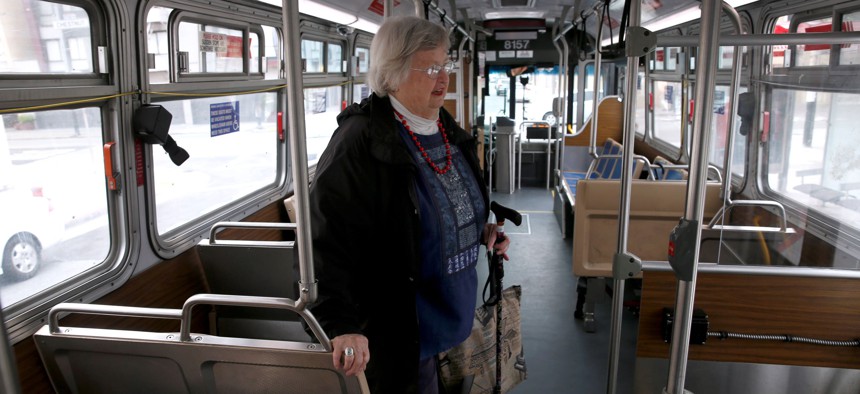Connecting state and local government leaders
COMMENTARY | State and local leaders have an unprecedented opportunity to deliver mobility solutions that work better for everyone.
Albert Einstein may have been the most famous person to say, “In the midst of every crisis, lies great opportunity.” If that is the case, then communities today are awash in opportunity. Faced with the twin challenges of climate change and a rapidly aging population, state and local leaders have an unprecedented opportunity to deliver transportation and mobility solutions that work better for everyone.
Significant population changes are underway in the U.S., which amplify the climate-related risks many will face. Older adults are the fastest growing demographic in the nation. By 2034, people over 65 will outnumber children under 18 for the first time ever. A century ago, 1 in 20 people was over 65 years of age; soon that number will be 1 in 5.
At the same time, managing rising temperatures, more extreme weather events and sea level rise requires a reassessment of how we live, work and get around. Mobility challenges compound older adults’ vulnerability to climate crises because they directly impact their ability to access needed services, utilize emergency support and evacuate if needed.
Nearly 20% of older adults do not drive—and that number is higher still for women over 75, among whom 35% do not drive. Driving does not determine mobility, of course; people who walk, bike, or take transit can remain mobile with the right infrastructure and weather. But 40% of older adults live with ambulatory limitations, and most transit systems don’t provide sufficient seating and shelter to allow their use in extreme conditions. Even among programs designed to provide enhanced mobility for seniors and people with disabilities (often covered by Section 5310 funds administered by the U.S. Department of Transportation), there is no requirement that paratransit or volunteer programs ensure operations during disasters. Communities have been encouraged to collaborate on this challenge, but they are not required to provide any operational solution.
If we are to find the “opportunity” in these concurrent and intersecting trends, it is in the urgency to create a transportation system that truly serves the needs of all in a future of intense weather events and more extreme temperatures. There are multiple actions that state and local leaders can take now to better plan for that future:
- Assess the needs. A critical first step must be to identify where older adults live, what their mobility and transportation needs are and what transit services exist for those residents. Then communities can identify the mobility gaps and map them against future climate conditions that can impact older adults’ ability to reach services, support and aid.
- Map the risks. The climate-fueled risks facing communities and the older adults who live in them are diverse: longer summers, colder winters, more extreme rainfall and storms and more frequent wildfires leading to dangerous smoke-filled air. For the 80% of older adults who live with two or more chronic health conditions—such as hypertension or respiratory disease—each of these risks poses a genuine threat to their health and well-being, and therefore to their ability to leave their home without the assurance of support. It is essential that communities identify, communicate and plan for the actual risks that older adults are likely to face.
- Plan for access. Resilience hubs—which serve as multipurpose shelters, cooling/warming centers and places for residents to charge phones and get help—run the risk of failing to serve older adults unless they consider how those residents will get to those facilities. Resilience hubs cannot be disconnected from the transportation assets needed to reach them, so there must be multiple, redundant and reliable ways for non-drivers and mobility-impaired people to reach them. That must also include provisions for the needs of people with disabilities and those who use mobility aids like wheelchairs and walkers.
The notion of channeling opportunity from crisis requires that we see the potential to grow and adapt to new conditions. Never before has the need been greater, as we confront a future where one in five people require safe, accessible and resilient transportation other than driving. The solution will likely be a mix of enhanced programs, policies and infrastructure investments that better reflect the needs of an aging population.
But it begins with recognizing we have an increasingly older population that will need help managing climate change related challenges. Understanding how those factors affect mobility and then committing to planning for a different outcome—one that will ultimately benefit people of every age—begins with prioritizing the needs of our oldest residents.
Danielle Arigoni is managing director of policy and solutions at National Housing Trust and the author of Climate Resilience for an Aging Nation.

NEXT STORY: Feds tout pedestrian, cyclist safety measures in new road design rules



